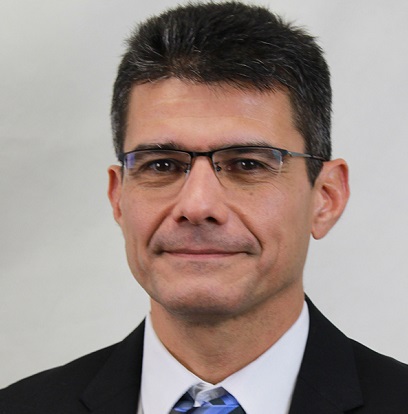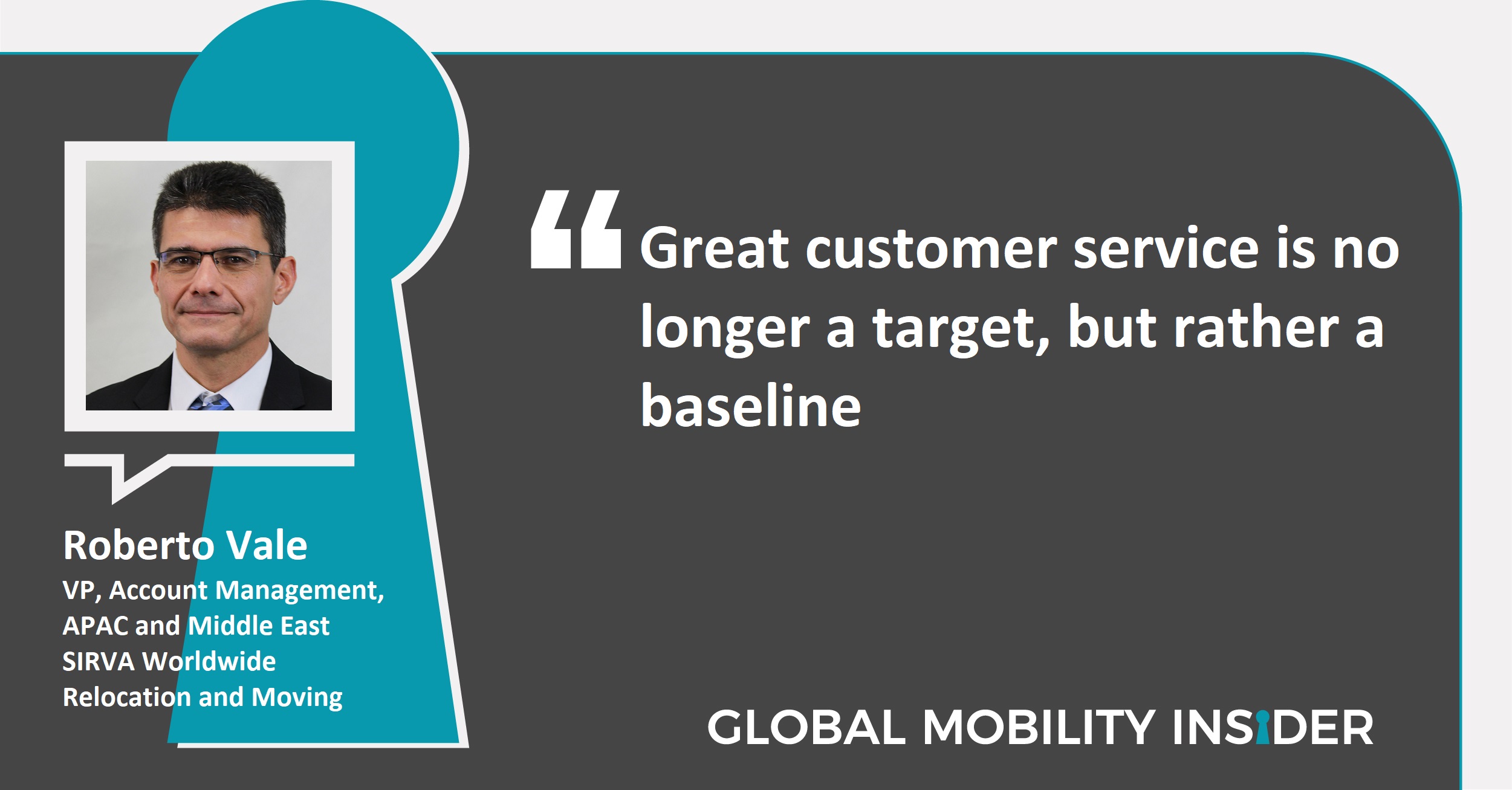Roberto Vale - VP, Account Management, APAC and Middle East - SIRVA Worldwide Relocation and Moving
Name: Roberto Vale
Position: VP, Account Management, Asia Pacific and Middle East
Company: SIRVA Worldwide Relocation and Moving

Professional Background
SIRVA Worldwide Relocation and Moving, VP, Account Management, Asia Pacific and Middle East (Singapore): 2017 – Present
Cartus, Director, Client Services (United States and Singapore): 2002 – 2017
Career Insider
Q: Why global mobility, and how did you get started in the industry?
A: I was born and raised in Fortaleza, on the Northeast coast of Brazil. Before joining global mobility, I worked in logistics for a Brazilian airline and also launched my own video production company. Mobility came into my life in 2002, right after I finished my master’s in International and Intercultural Management in Vermont. I worked in Connecticut for 8 years and, in 2010, relocated to Singapore. What attracted me then still motivates me today: the opportunities to discover the world and to interact with people from a variety of backgrounds. My areas of focus during these 16 years have been primarily on account management and operations. I have had great mentors and great leadership on this journey. One of my personal objectives is to pass these examples forward, mentor and create opportunities for others to succeed and be the best they can be.
Click & Like on LinkedIn
Q: What is 'business as usual' like for you at SIRVA?
A: SIRVA exemplifies what a customer-centric, agile, financially responsible company should look like. In practical terms, this is reflected in the amount of time we spend engaging with our clients, visiting the markets where their employees live and work, and sponsoring industry events. These activities inform our business decisions and are the primary drivers of our human capital allocation.
Business as usual at SIRVA to me means three things: we always start discussions with our clients’ needs in mind; we all collaborate on projects regardless of title and seniority because we value the diversity of skills and life experiences that each person brings to the table; and we are all equally expected to be financially responsible for the sustainability of our business when making our day-to-day decisions. This is an incredible place for those seeking to be positively stretched, to learn how to effectively exercise autonomy and accountability, and to experience an organization in growth mode.
Q: What aspect of your work at SIRVA do you find most exciting?
A: I personally enjoy the pragmatic element of SIRVA’s culture. We certainly carry a clear vision as to how we can best support our clients, but we also appreciate the fact that that vision can only be achieved through practical day-to-day decisions. Our meetings are purposeful and we are efficient in making decisions. Another element that I value is the flexibility and can-do attitude in everyone. If you are present, you are part of the solution, regardless of your title or seniority. We are all expected to roll up our sleeves when something needs to be done. These three elements combined generate a strong ethos of purpose and accountability that I very much appreciate at SIRVA.
Industry Insider
Q: What aspect of global mobility is likely to keep you up at night?
A: The words compliance and safety come to mind. As a discipline, one of global mobility’s core propositions is to advise and protect the interests of our clients regarding immigration and tax compliance matters. This is a tremendously arduous remit given the breadth of legislation, number of countries to be considered in a typical mobility program, the frequency of changes to government policies, and the ambiguity in the language used by governmental agencies. Another aspect that is always present on our radar is the safety of the families we help relocate, especially to locations where the infrastructure and governance standards are broadly assessed to be below par. We guide our clients with tried-and-tested practices around emergency evacuations, housing security assessment and country briefings. Risk mitigation strategies requires a high level of synergy and partnership between all players.
Q: What do you think is the primary thing hindering the global mobility industry's progress?
A: I think more in terms of what is shaping, rather than what is hindering the mobility narrative in the present moment. That element in my opinion is technology or, more precisely, how digital platforms can effectively enable and strengthen the human interaction during the process. Our industry is rife with disruption and finds itself at a state of technological transition. Our business models need to adapt to new cycle times and price points, and our clients’ framework around talent mobility needs to also adjust to different sets of expectations from their employees.
In the next 3-5 years, we will see consolidation and innovation in the market, and the new normal delivery is likely to contain a greater presence of digital platforms on one-way transactional tasks, which then support relational items (helping a family understand their service options or support during challenges for example) delivered by well-rounded, articulated and knowledgeable mobility consultants.
Q: What is the most important strategic tip you can give to companies handling global mobility?
A: Pay attention to talent mobility. In other words, frame and articulate your business proposition as an extension of your clients’ talent strategy. A sound mobility program is key to our clients’ success in attracting, developing and extending their talent’s tenure in the company. Our relevance is fundamentally dependent on our continued ability to understand how Mobility intersects with our clients’ business strategies. There is a multitude of challenges in gaining those insights, of course, however that is what will define the next generation of successful global mobility specialists.
Visionary Insider
Q: What more can be done to improve current global mobility practices to benefit talents on the move?
A: One positive trend that I already see happening is that the mobility function within our clients is becoming incredibly more strategic in the way it engages internally, much better equipped to operate in lockstep with their different business units.
In addition, I think we should pay more attention to mid-career professionals from other industries who want to join the mobility path as consultants. Our clients’ expectations of our human capital are very different from what it was in the early 2000’s, for example. Great customer service is no longer a target, but rather a baseline. We hear loud and clear from our client base that they expect effective communication skills, emotional maturity and critical thinking skills, particularly from those in the frontline supporting our relocating families. There are good people out there with these skills who are ready for a career change. What is required is a shift on how and where we look for the right talent.
Last, but not least, it is important for global mobility to continue to fully leverage all the existing industry events by curating provocative topics for discussion. Commercial interests aside, it is in the best interests as an industry for all global mobility players to promote our discipline through increased research and debate with affinity groups such as chambers of commerce, expat associations and academic institutions with cross-cultural curricula.
Q: What are the major developments you currently see happening in the industry, and how do you feel about them?
A: Firstly, I have seen an increase of mobility practitioners’ breadth and depth of knowledge. There is much more consultation being provided to our clients today than ever before. We are invited into a partnership of equals with our clients and we are expected to be an extension of their talent mobility leadership teams. This is very exciting to watch.
Secondly, I have seen a clear shift in global assignment patterns. I remember that in the early and mid-2000’s, the talent flow was still predominantly West-East, broadly speaking. Today, Asia and Latin America have come of age due to a better educated talent pool, better infrastructure and increased government focus in protecting native human capital. Chinese, Indian and Brazilian companies operate on very different cultural tapestries, and we are in the process of amending our “playbook” to align with new market and cultural requirements.
Thirdly, digital technology continues to transform our industry. The ubiquity of web- and cloud-based applications has increased productivity, enabled more people to migrate for work and helped diversify the types of mobility programs available. It needs to be said also that our industry is primed for disruption because of technology. As stated earlier, we are already seeing changes to our business models and I suspect we will also see increased integration of mobility companies in the very near future.
Either/Or…
- Short-term or long-term assignment? It has to be both. Initiations for short-termers is on the rise and long-term assignments are the right approach when the objective is to promote organizational change, for example.
- Airbnb or serviced apartments? Serviced apartments for corporate relocation.
- Excel or global mobility software? Global web-based platforms.
- Lump-sum or flex-ben? Core-flex reflects the direction that the mobility discipline is taking.
- Facebook or LinkedIn? LinkedIn.
- Outlook or Gmail? Outlook.
- Taxi or Uber? Uber.
- iOS or Android? iOS.
- Mac or PC? PC.
- Computer or tablet? Laptop.
- Work hard or play hard? It has to be both for a balanced carpe diem life.


Leave a Comment
* Fields marked with this asterisk are mandatory.